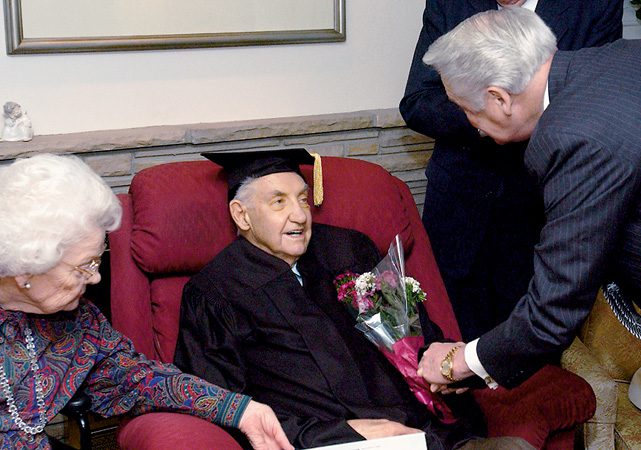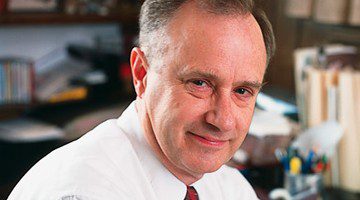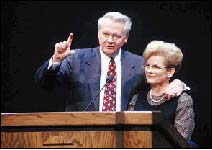
Whether he’s acting as fraud detective, accounting expert, or father, Steve Albrecht looks for every opportunity to do what he loves best: Teach.
By Michael R. Walker, ’90
If you spend any time with W. Steve Albrecht, ’71, associate dean of the Marriott School of Management, you will note a recurring pattern in his side of the conversation. No statement is left unsupported; rather, it is often followed by the words, for example, and then an application of the principle at hand unfolds. Albrecht is first and foremost a teacher.
Albrecht has received awards for outstanding teaching at Stanford University, the University of Illinois, and the University of Wisconsin. In August 2001 he received the Karl G. Maeser Distinguished Faculty Lecturer Award, BYU‘s highest faculty honor, for his superior scholarship and teaching. Last year an anonymous donor who had followed Albrecht’s career contributed $250,000 to fund the W. Steve Albrecht Professorship in Accounting at BYU.
His influence is not confined to academia. Albrecht’s list of awards is filled with acronyms—AAA (American Accounting Association), FSA (Federation of Schools of Accountancy), AICPA(American Institute of Certified Public Accountants)—and adjectives—outstanding and distinguished—being the most repeated. In 1997 and again this year, Accounting Today named Albrecht one of the 100 most influential accounting professionals in the United States.
A specialist in white-collar crime and business fraud, he is often called on as an expert witness in court cases. In August 1998 he received the Cressey Award from the Association of Certified Fraud Examiners, the group’s highest award for achievement in fraud detection and deterrence. (Past winners include Jane Bryant Quinn of Newsweek magazine and New York City mayor Rudolph Giuliani.)
Despite all the achievements and accolades garnered in the business world, teaching is what he loves, and teaching is why he is at Brigham Young University. “I came here to be a teacher, and that’s the most rewarding part of what I do. I’m always thinking about the class I’m going to teach next and gathering articles and new things I can use in the class.”
ALWAYS A TEACHER
With his plentiful use of examples in his teaching, it is no surprise that Albrecht himself is an example—a model of excellence in scholarship and teaching—to students and peers. “He teaches almost exclusively by example,” says former student J. Cody Worthington, ’00. “He truly enjoys what he does and knows everything we talked about in class. He even wrote the textbook.” And Albrecht’s experience and contacts in the accounting world provide a ready supply of examples to share in the classroom, according to Worthington.
While at BYU Worthington worked as a research assistant for Albrecht. After graduation Worthington went to work in Washington, D.C., for the Business Fraud and Investigative Services Group of Arthur Andersen, one of the Big Five professional service firms. “In my training as an auditor and in my fraud training, Steve Albrecht’s name repeatedly comes up. He’s in videos, training manuals, and exams. Mentioning his name garners me respect and instant attention. People recognize his name and associate it with professionalism and integrity. My education has landed me tremendous opportunities.”
Such success stories are common among graduates of BYU‘s accounting program. The curriculum Albrecht helped develop is among the best in the nation and serves as a model for accounting programs around the world. Prior to becoming associate dean of the Marriott School, Albrecht served for eight years as the director of the School of Accountancy and Information Systems at BYU. During that time BYU‘s undergraduate and graduate accounting programs were ranked second and third in the United States.
As a teacher Albrecht enjoys the freedom he has at BYU. “I believe I have more academic freedom here than I’ve ever had before,” he says. “I like to bring together the gospel and academic learning, and you can do that here. I’m never hesitant to teach the truth in the context of the business school.”
At home, in a chapel, in the classroom, conference room, or court room—no matter where you find him—Steve Albrecht is teaching. “If I’m an expert witness, I’m teaching a jury. And I try to teach complex topics in an easy-to-understand way. I try to do the same thing in the classroom. In my church role I try to teach college students how to take personal responsibility. I try to teach companies when I consult. And I try to teach people with whom I work how to be better and more productive.”
ASSESSING ACCOUNTING’S FUTURE
Albrecht’s mark in accounting education goes beyond being a respected teacher. He has also become a respected voice in the discussion about the field and its future. In 2000 he and Robert J. Sack, an emeritus business professor at the University of Virginia, published the monograph Accounting Education: Charting the Course Through a Perilous Future. The study warns that without careful analysis and change, accounting education may not survive.
“The most critical issue facing the profession today is how to attract more and brighter students into the profession,” Albrecht writes in the Sept. 24, 2001, issue of Accounting Today. “Accounting enrollments are down considerably nationwide, the number of candidates sitting for the CPA exam is down considerably, and the number of high school students who say they will major in accounting is half what it used to be. Without students to become accountants, we won’t have a profession in the future.”
Jan R. Williams, a dean at the University of Tennessee and past president of the AAA, leads a group of accounting professionals whose goal is to maintain an emphasis on the issues raised in the monograph. “I believe many schools are seriously using the monograph to help them figure out what is next for them,” Williams says, acknowledging Albrecht’s contributions. “He has been a tremendous asset to this project, as well as to accounting education in a broader sense.”
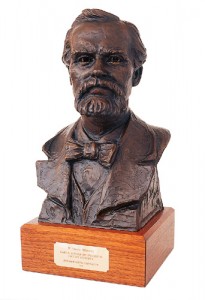
After his devotional address on Oct. 30, 2001, Albrecht received the Karl G. Maeser Distinguished Faculty Lecturer Award, BYU’s highest faculty honor, in recognition of his outstanding teaching and scholarship.
The business world is changing rapidly, says Albrecht, requiring flexibility in students as well as in business schools. “We tell the students that we are going to give them a good base but that everything we teach them will probably be outdated in four or five years. The education they get here is just the beginning. They’ve got to have a lifelong program of continuing education.”
Predictably, Albrecht follows this statement with, “I’ll give you an example. My specialty happens to be fraud and forensic accounting. That’s a subject I never took in college. Everything I know I’ve learned since I graduated. When I took the certified public accountancy exam, there were only 15 standards. Today most of those standards have been superseded and aren’t relevant anymore.”
Technology and globalization are changing traditional accounting, he says, noting that the world still sometimes perceives accountants as sheltered introverts wearing green eyeshades while keeping the books. “The role of an accountant as a scorekeeper is not nearly as important as it used to be because of technology. Today an accountant is a decision maker, part of the business management team. And a student who cannot make that kind of contribution will not be successful.”
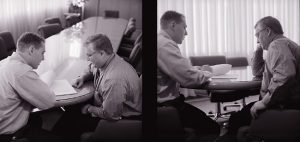
Even at work Albrecht finds ways to spend “quantity time” with his family. He investigates fraud with his son Conan (shown here), a BYU information systems assistant professor, and is writing a textbook with his son Chad, a BYU business student.
HIGH-TECH DETECTIVE
Because of his analytical abilities and extensive research on white-collar crime and business fraud, Albrecht is often called to assist in high-profile cases that involve millions, and sometimes billions, of dollars. He was a consultant and expert witness in the Lincoln Savings and Loan criminal case against Charles Keating, who was a key figure in the savings and loans scandals of the 1980s.
Albrecht’s study of fraud has resulted in the publication of more than 80 articles in professional journals. His three widely used textbooks on the topic are in their eighth edition. “I’ve done a lot of work in three areas: fraud prevention, fraud detection, and fraud investigation. I’ve worked inside companies, I’ve taught it, and I’ve researched it. Now with developments in technology, we’re using technology to detect fraud.”
Albrecht is working with his second son, Conan C. Albrecht, ’97, a BYU information systems assistant professor, to explore more effective ways to investigate fraud. They have become high-tech detectives, following trails of data, and occasionally revealing the perpetrators of costly crimes.
After developing an understanding of a business, they look for specific symptoms—red flags—that fraudulent actions might generate. Then they build customized computer programs to sift through a company’s databases. For one oil company the Albrechts identified 26 fraud possibilities.
Before advances in computing, fraud prevention and detection involved setting up hot lines, providing fraud training, and performing statistical sampling. “The problem with statistical sampling is you could only use a small part of the entire population, and then you were subject to sampling error. Now with technology and the right kind of queries, you can look at 100 percent of the transactions. Technology has made fraud both easier to commit and easier to detect.”
“The whole purpose of a fraud investigation is to find the truth. A fraud investigator that says, ‘I want to catch this person,’ is taking the wrong attitude. You have to be honest to the evidence. If it supports the fact that the person is guilty, that’s one thing. If it supports that the person is innocent, you have to be true to both sides of the data. I tell people right up front, ‘I’ll be an expert witness, but if I get into this and I think you’re on the wrong side of the case, I’m going to resign.'”
SERVICE AND FAMILY
When Steve Albrecht enters the N. Eldon Tanner Building from the east, he passes by a bust of the building’s namesake. Below the bronze these words are engraved: “Service is the rent we pay for living in this world of ours.”
In his Oct. 30, 2001, devotional address, Albrecht emphasized the impact that quotation has had in his life. “I have been unable to get those words out of my mind and, in fact, they have guided much of what I have done throughout my entire career. Based on that inscription, I made a commitment early as a professor that I would never decline an opportunity to serve and that when I did serve, I would do my best. That motto has provided both me and my family with great opportunities and experiences.”
Albrecht serves in a stake presidency in Orem, Utah, and is national president-elect of Beta Alpha Psi, the national accounting honors fraternity that recently named him Educator of the Year. He is also the national chair of the Blue Ribbon Accreditation Committee of the Association to Advance Collegiate Schools of Business.
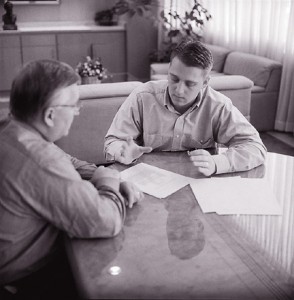
“Steve’s work capacity is without peer. He accomplishes more per day than any person I’ve ever known.” -Ned Hill
Also early in his career, Albrecht decided he would set his standard higher than any external requirement imposed on him. “For example, if it takes eight articles to get tenure, I wanted to have two or three times eight. If it takes 5.5 teaching ratings, I wanted to have 6.5. My own internal drive has pushed me to exceed far enough above the bar that there would never ever be a question.”
Albrecht’s high expectations and work ethic were inherited from industrious parents who kept the small town of Bicknell, Utah, running. “My dad was the town businessman. Before I was born he had a service station. When I was growing up, he owned a store, a sawmill, two motels, and a restaurant. My mother was the postmaster. She and my father always expected the best out of us, and those expectations have kept me going.”
Ned C. Hill, ’70, dean of the Marriott School, has high praise for his colleague: “Steve’s work capacity is without peer. He accomplishes more per day than any person I’ve ever known.”
How Albrecht schedules his time reveals his sense of priorities. He takes a calendar with all 12 months on one page. Then, using different colors, he begins to organize his year, starting with BYUcommitments (in blue), then family (in red), then church, then consulting. “If someone asks me to do something on a day we’ve planned a family trip or a day at our cabin, I can honestly say I already have an important commitment.” On the east wall of his office in the Tanner Building hangs a large portrait of Albrecht’s family. “Whenever somebody calls me on the phone and says, ‘We’d like you to do this or this,’ I look at my family and ask, ‘Is it worth it?'”
Color-coding may keep Albrecht’s calendar organized, but it doesn’t necessarily extend to his closet. His wife, LeAnn Christiansen Albrecht, ’71, says Steve sometimes depends on his family to keep him fashionably coordinated. “He will come down with different- colored socks on. We have to check him out in the morning after he gets dressed to make sure he is all put together. It’s just not a priority for him. One time he went on a business trip and he had taken the suit pants of one suit and the jacket of another and never realized it until he came home.”
LeAnn says that Steve’s productivity comes from his organizational skills and type A personality. “He’s energetic, focused, and loves his work at the Y. He’s just going every single minute. The only time he relaxes is with a fishing pole in his hand. It is such a contrast.”
The two were in the same family home evening group when they were students at BYU. He received his accounting degree and she graduated in elementary education and child development on the same day. They have been married 30 years and have six children and four grandchildren.
As his children grow older, Albrecht finds ways to spend more hours with them. He is working with Conan on an article and with his son Chad, a BYU business student, on a textbook. “That’s what you have to do, you have to find ways that leverage your work to involve your children and your family. My son is excited to be an author on a textbook, and it gives me an opportunity to work with him. There are other coauthors I could have had, but I’m writing this book with my son.”
Whenever possible, Albrecht also spends time with his family by bringing them along when he travels. Conan and his wife, Laurel Hansen Albrecht, ’97, accompanied Steve and LeAnn to last year’sAAA conference. “Laurel had known Dad for many years as a neighbor and father-in-law,” says Conan. “She knew him as a humble, hardworking person. However, she did not expect the ‘hero worship’ she saw at the conference. Person after person came up to Dad and spoke of how he inspired their careers, how they had followed his publications and research, and how he was a hero in the field. Laurel was extremely impressed. While he had had this type of influence, he had been to her a meek and humble person.”







